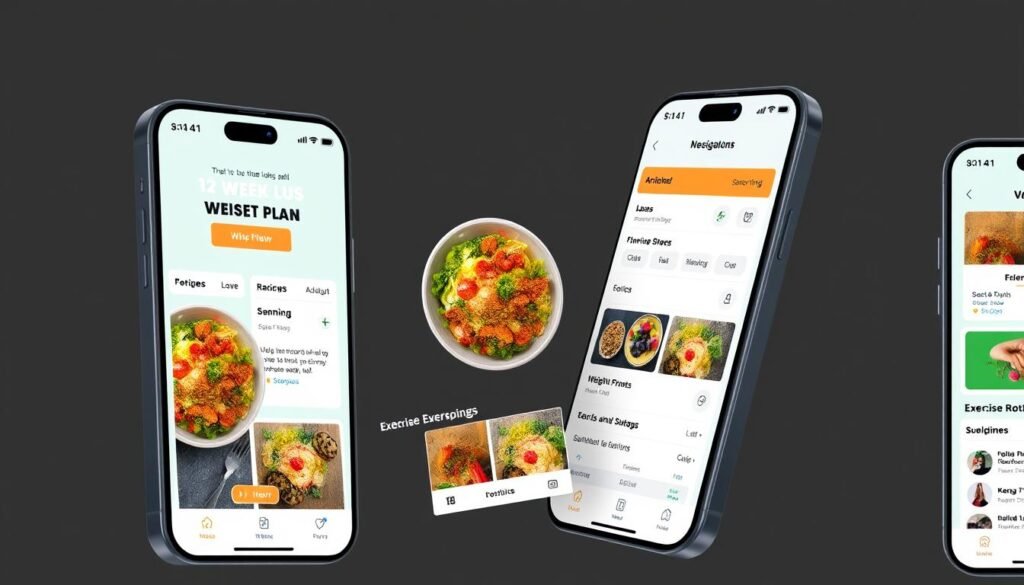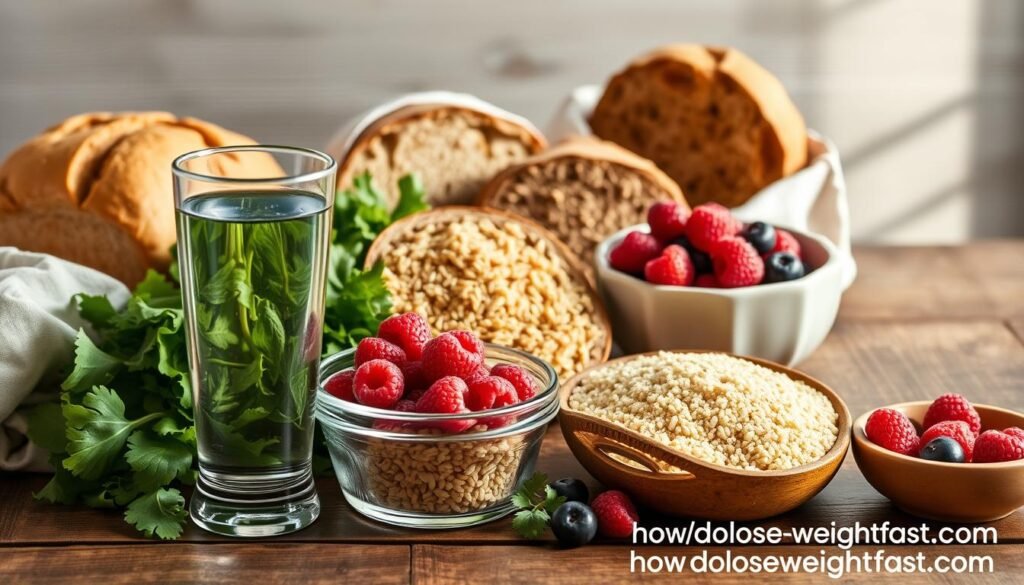Lose Weight Fast in England: Your Guide to Quick Fat Loss
“You don’t have to be great to start, but you have to start to be great.” These words by Zig Ziglar resonate deeply with anyone embarking on a weight loss journey. If you’re overweight, losing weight can have numerous health benefits, including reducing the risk of developing conditions like high blood pressure, heart disease, and type 2 diabetes.
Making small, simple changes to your diet and lifestyle can significantly help weight loss. This guide is designed to walk you through practical, sustainable approaches to achieving your weight loss goals, leveraging NHS resources and local fitness opportunities.
Key Takeaways
- Discover effective strategies for achieving weight loss tailored to the British lifestyle.
- Learn how maintaining a healthy weight can reduce the risk of serious health conditions.
- Explore practical approaches to weight loss that fit into your busy life.
- Find out how to leverage NHS resources and local ingredients for a personalized weight loss plan.
- Gain a clear roadmap to achieve your weight loss goals efficiently.
Understanding Weight Loss Fundamentals
Before starting your weight loss journey, it’s essential to comprehend the science behind it. Many factors around food and activity influence weight gain, and understanding these can help you make informed decisions.
The Science Behind Fat Loss
Your body burns fat through a process called lipolysis, where fat cells are broken down into fatty acids and glycerol, which are then used as energy. Creating a calorie deficit is crucial for fat loss, meaning you consume fewer calories than your body burns. This can be achieved through a combination of reducing your dietary intake and increasing physical activity.
Setting Realistic Weight Loss Goals
To achieve successful weight loss, setting SMART (Specific, Measurable, Achievable, Relevant, Time-bound) goals is vital. This involves defining your weight loss objectives clearly, tracking progress, and ensuring your goals are realistic and aligned with your lifestyle. By doing so, you’ll be more motivated to stick to your plan and make sustainable lifestyle changes that help weight management in the long term.
Assessing Your Starting Point
Understanding your current health status is key to achieving your weight loss goals. To create an effective plan, you need to know where you’re starting from.
Calculating Your BMI
Your Body Mass Index (BMI) is a crucial metric that compares your weight to your height, indicating whether you’re at a healthy weight, have excess weight, or obesity. You can use a BMI calculator to determine your BMI and understand how much weight you need to lose for a healthier status.
| BMI Category | BMI Range | Health Risk |
|---|---|---|
| Underweight | Less than 18.5 | Low |
| Normal weight | 18.5-24.9 | Low |
| Overweight | 25-29.9 | Moderate |
| Obese | 30 or greater | High |
Understanding Your Body Type
Your body type, whether you’re an ectomorph, mesomorph, or endomorph, significantly affects your health and weight loss approach. Understanding your body type helps you tailor your diet and exercise plan for optimal results.
NHS Weight Loss Resources in England
The UK’s National Health Service (NHS) offers a variety of weight loss resources tailored to individuals in England. These resources are designed to support your weight loss journey, providing you with the tools and guidance needed to achieve your goals.
Free NHS Weight Loss Plan App

The NHS Weight Loss Plan app is a valuable resource that helps you develop healthier eating habits and become more active. The app provides a structured 12-week plan, allowing you to set weight loss goals, plan meals, and track your progress.
NHS-Supported Weight Loss Programs

In addition to the app, the NHS offers various weight loss programs across England. These programs include local group sessions and specialized support for different needs, ensuring that you receive the guidance and motivation required to succeed.
By utilizing these NHS resources, you can create a comprehensive weight loss strategy that suits your needs and lifestyle. The NHS Diabetes Prevention Programme is also available to help those at risk of developing type 2 diabetes through weight management.
Creating Your Personalized Quick Fat Loss Plan
A customized weight loss plan is the key to unlocking your full potential and achieving a healthier, slimmer you. To lose weight, the energy you eat (calories) needs to be less than the energy you use. This can be achieved by creating a sustainable calorie deficit that accounts for your unique metabolic rate, activity level, and weight loss goals.
Designing a Sustainable Calorie Deficit
To create a calorie deficit, you’ll need to determine your daily calorie needs and adjust your intake accordingly. Aiming to lose weight at a healthy rate of 1-2 pounds per week is recommended. This can be achieved by reducing your daily calorie intake by 500-1000 calories. As
“The key to a successful weight loss journey is a combination of a healthy diet and regular exercise.”
A well-balanced diet that includes plenty of fruits, vegetables, whole grains, and lean protein sources will help you achieve your weight loss goals.
Tracking Your Progress Effectively
Tracking your food intake and exercise is crucial to achieving your weight loss goals. You can use various tools, such as apps or journals, to monitor your progress. Regular check-ins and assessments will help you stay on track and make adjustments when necessary. By tracking your progress, you’ll be able to identify patterns and make informed decisions about your weight loss journey. A progressive plan that evolves as you lose weight will prevent the common plateau effect that discourages many people.
Nutrition Strategies for Quick Fat Loss in England
Achieving quick fat loss in England requires a comprehensive understanding of nutrition strategies tailored to the local diet. To remain healthy, your diet still needs to be balanced, focusing on eating more foods like fruit and vegetables, beans, whole grains, and oily fish.
British Dietary Guidelines for Weight Loss
The official British dietary guidelines provide a foundation for healthy eating, which can be adapted for weight loss. These guidelines emphasize the importance of a balanced diet rich in fruits, vegetables, and whole grains. By following these guidelines, you can create a sustainable calorie deficit that supports weight loss while maintaining proper nutrition.
Meal Planning with Local Ingredients
Meal planning is crucial for successful weight loss. By incorporating seasonal British produce into your meal plans, you can maximize nutrition and minimize cost. For example, you can create healthy meals using ingredients readily available in English supermarkets like Tesco, Sainsbury’s, and Aldi. You can also adapt the Mediterranean diet pattern, which has strong evidence for weight loss, using local ingredients. Check out this 7-day plan to lose 10 pounds for inspiration.
- Eat more fruits and vegetables, aiming for at least 5 portions a day.
- Incorporate beans and whole grains into your meals for added fiber and nutrition.
- Choose oily fish like salmon and mackerel for their omega-3 benefits.
The Power of Protein in Your Diet
Incorporating the right amount of protein into your daily meals can significantly impact your weight loss journey. Protein takes longer to digest than simple carbohydrates, providing steadier blood sugar control and greater satiety.
Recommended Protein Sources
You can find protein in various food sources. Animal-based options include eggs, meat, and dairy products. For vegetarians and vegans, plant-based alternatives like nuts, legumes, and tofu are excellent choices.
Optimal Protein Timing
Distributing protein throughout the day is crucial. Aim for 1.6-2.2g of protein per kg of body weight daily. Consuming protein after workouts and in the morning can help preserve muscle mass while you lose weight. Including oily fish in your diet can provide additional benefits.
| Protein Source | Protein Content |
|---|---|
| Eggs | 6g per large egg |
| Chicken Breast | 31g per 3 oz serving |
| Salmon | 20g per 3 oz serving |
Smart Carbohydrate Choices
Making smart carbohydrate choices is crucial for your weight loss journey in England. Carbohydrates are a primary source of energy for your body, but not all carbs are created equal.
Understanding Good vs. Bad Carbs
Good carbs, such as whole grains, fruits, and vegetables, are rich in fiber and nutrients. They help maintain stable sugar levels and provide sustained energy. On the other hand, bad carbs, like refined grains and sugary foods, cause a spike in sugar levels and can hinder your weight loss efforts.
Incorporating Whole Grains
Incorporating whole grains into your diet can be beneficial for your overall health and weight management. Whole grains like brown rice, quinoa, and whole-wheat bread are rich in fiber and nutrients. They also contain resistant starch, which is formed when starchy carbs like potatoes, pasta, and rice are cooked and then cooled. Resistant starch acts as a prebiotic, fueling your gut bacteria and supporting a healthy body.

Healthy Fats for Weight Management
Healthy fats play a crucial role in weight management and overall health. Despite being high in calories, they are essential for various bodily functions, including hormone production and feeling full after meals.
Some foods high in healthy fats include oily fish, unsalted nuts, and avocados. These foods contain unsaturated fats that help maintain healthy cholesterol levels. For instance, oily fish like salmon, mackerel, and sardines are rich in omega-3 fatty acids, which are beneficial for heart health and can aid in weight management.
Benefits of Oily Fish and Other Omega-3 Sources
Oily fish are an excellent source of omega-3 fatty acids, which have been shown to support weight loss and overall health. Other sources of omega-3s include flaxseeds and walnuts. Incorporating these foods into your diet can provide numerous health benefits.
Portion Control for Fats
While healthy fats are beneficial, it’s crucial to practice portion control due to their high calorie content. Limiting your intake of these foods and being mindful of serving sizes can help you reap their benefits without consuming excess calories.
Here’s a guide to help you understand the appropriate portion sizes for different fat sources:
| Food | Serving Size | Calories per Serving |
|---|---|---|
| Oily Fish (salmon) | 3 oz | 180 |
| Avocado | 1/2 medium | 110 |
| Unsalted Nuts (almonds) | 1 oz (23 nuts) | 161 |
By incorporating healthy fats into your diet and being mindful of portion sizes, you can support your weight loss journey and overall health.
Hydration and Weight Loss
Hydration plays a vital role in metabolism and appetite control, aiding in weight loss. Drinking enough water can help you distinguish between thirst and hunger, reducing unnecessary snacking.
A 2010 study found that individuals who drank a glass of water 30 minutes before a meal lost 44% more weight than those who didn’t, over a 12-week period.
Water Intake Guidelines
To support your weight loss journey, aim to drink at least 8-10 glasses of water per day. You can also consume water-rich foods like fruits and vegetables to contribute to your daily hydration needs.
Reducing Sugary and Alcoholic Beverages
Cutting back on sugary drinks like soft drinks, fruit juices, and sweetened tea can significantly reduce your calorie intake. Moderating alcohol consumption is also crucial, as it not only adds calories but also impairs your body’s ability to burn fat efficiently.
Effective Exercise Routines for Fast Results
To achieve fast weight loss, incorporating effective exercise routines into your daily life is crucial. The NHS recommends 150 minutes of moderate intensity activity, like cycling or brisk walking, a week. However, research shows that people living with obesity are less likely to exercise for this amount of time each week than people who are not obese.
Cardio Workouts for Maximum Fat Burning
Cardio exercises are a great way to burn fat and improve your overall health. High-Intensity Interval Training (HIIT) is particularly effective and can be completed in just 20-30 minutes. This type of training involves short bursts of high-intensity exercise followed by brief periods of rest. You can monitor your intensity by checking your heart rate or using the talk test – you should be able to speak only a few words at a time.
Some examples of cardio workouts include jogging, cycling, and swimming. You can also incorporate bodyweight exercises like burpees, jump squats, and mountain climbers into your routine.
Strength Training to Boost Metabolism
Strength training is another essential component of an effective weight loss program. It helps build muscle mass, which can boost your metabolism and burn more calories at rest. You can do strength training exercises at home with minimal or no equipment, focusing on compound movements like squats, lunges, and push-ups.
A sample strength training routine could include:
| Exercise | Sets | Reps |
|---|---|---|
| Squats | 3 | 12 |
| Lunges | 3 | 12 (per leg) |
| Push-ups | 3 | 12 |
Combining cardio and strength training in an efficient weekly schedule can maximize fat loss while fitting into your busy English lifestyle. For example, you could do cardio exercises on Monday, Wednesday, and Friday, and strength training on Tuesday and Thursday.
Incorporating Physical Activity into Daily Life
Incorporating physical activity into your daily life is a sustainable way to achieve your weight loss goals. By making small changes to your daily habits, you can increase your physical activity without dedicating extra time to exercise.
Walking After Meals
Walking at a brisk speed for 30 minutes after lunch or dinner can lead to greater weight loss for some people. Even a short 10-15 minute walk after a meal can have significant benefits for blood sugar control and fat burning.
Active Transportation Options in English Cities
You can leverage England’s public transportation system by adding walking segments to your commute. Many English cities also have growing networks of cycling paths and bike-share programs that you can use for both transportation and exercise.
Managing Stress for Better Weight Loss
Chronic stress not only affects your mental health but also has a profound impact on your body’s weight management capabilities. When you’re stressed, your body releases cortisol, a hormone that directly affects blood glucose levels and can contribute to weight gain.
Understanding the biological connection between chronic stress and weight gain is crucial. Elevated cortisol levels can lead to increased fat storage, particularly around the abdominal area, making it challenging to lose weight.
Stress-Reduction Techniques
To manage stress effectively, you can try various techniques. Brief meditation, deep breathing exercises, and mindfulness practices are all evidence-based methods that can help reduce stress levels. These techniques are particularly useful for busy lifestyles in England, as they can be adapted to fit into even the most hectic schedules.
The Cortisol-Weight Connection
The link between cortisol and weight gain is significant. Cortisol promotes fat storage and can lead to increased cravings for unhealthy foods. By managing stress through relaxation techniques, you can help regulate cortisol levels and support your weight loss efforts.
Identifying your personal stress triggers is also essential. By becoming more aware of what causes you stress, you can develop healthier coping mechanisms that don’t involve food. This might include setting boundaries around work and technology use to reduce chronic stress.
The Importance of Quality Sleep
Adequate sleep is essential for regulating the hormones that control your weight. When you don’t get enough quality sleep, it can disrupt your body’s natural balance, leading to weight gain. Poor sleep affects both cortisol and blood glucose levels, making you more likely to crave ‘sugar’ or carbs for energy and comfort.

Sleep’s Impact on Weight Loss Hormones
Sleep deprivation increases hunger hormones while decreasing satiety signals, making it harder to stick to your weight loss diet. Optimal sleep duration for weight loss is typically 7-9 hours, and it’s not just about quantity but also quality. Ensuring you get the right amount of sleep is crucial for managing your weight effectively.
Improving Your Sleep Routine
To improve your sleep, create a bedtime routine that works with England’s seasonal light changes. Optimize your bedroom environment by controlling temperature, light, and noise. Wind down in the evening without relying on alcohol or screens, as they can impair sleep quality and contribute to weight gain. By making these changes, you can enhance your sleep quality and support your weight loss journey.
Addressing Common Weight Loss Plateaus
Weight loss plateaus are a normal part of the weight loss process, and understanding how to address them is crucial. When you’re trying to lose weight, it’s common to experience a stall in your progress.
There are biological reasons why your weight loss may slow or stall after initial success. Metabolic adaptation and water retention patterns are key factors to consider.
Why Weight Loss Stalls
A weight loss stall can occur due to various factors, including a decrease in body metabolism and changes in time-related habits. Understanding these factors is essential to overcoming the plateau.
| Reasons for Weight Loss Stall | Impact on Weight Loss |
|---|---|
| Metabolic Adaptation | Reduces the body’s energy expenditure |
| Water Retention | Can mask fat loss progress |
Strategies to Overcome Plateaus
To overcome a weight loss plateau, consider calorie cycling, changing your exercise routines, and reassessing your portion sizes. Focusing on non-scale victories and health improvements can also help maintain motivation during frustrating plateau periods.
By understanding the causes of weight loss plateaus and implementing effective strategies, you can continue to make progress on your weight loss journey.
Maintaining Your Results Long-Term
Maintaining weight loss over time requires a sustainable plan that balances flexibility with healthy habits. After achieving your weight loss goals, it’s essential to transition into a maintenance phase that supports long-term weight management.
Transitioning from Weight Loss to Maintenance
This phase involves gradual calorie increases and psychological adjustments to maintain your new weight. You can learn more about effective weight loss strategies at https://howdoloseweightfast.com/how-to-lose-weight-fast-naturally-at-home/. Research on successful long-term weight maintenance shows that people who keep weight off for good often adopt consistent habits.
Building Sustainable Habits
Focus on eating well 80% of the time and allow yourself the occasional indulgence. This approach builds a healthier relationship with food and promotes lasting behavioural changes. By creating a maintenance plan that allows for flexibility, you can prevent weight regain and maintain your results over time.
Conclusion
As you embark on your weight loss journey, remember that small, consistent changes can lead to significant results. By leveraging the comprehensive strategies outlined in this guide, you’re well on your way to achieving your weight loss goals.
We’ve covered a range of effective methods, from utilizing NHS resources to optimizing your nutrition, exercise, sleep, and stress management. This holistic approach ensures that you’re not just losing weight, but also improving your overall health and adopting a sustainable lifestyle.
Start with small, manageable adjustments today, and build upon your successes over time. By doing so, you’ll be able to lose weight and maintain your ideal weight in the long run, transforming not just your weight, but your relationship with food, exercise, and self-care.
FAQ
What is a healthy rate of weight loss?
Aiming for a weight loss of 1-2 pounds per week is considered a healthy and sustainable rate. This can be achieved by creating a calorie deficit through a combination of diet, exercise, and lifestyle changes.
How can I track my progress effectively?
You can track your progress by monitoring your weight, measurements, and body fat percentage. Additionally, keeping a food diary or using a weight loss app can help you stay on track and make adjustments to your diet and exercise plan as needed.
What are some effective stress-reduction techniques for weight loss?
Techniques such as meditation, deep breathing, and yoga can help reduce stress and cortisol levels, which can contribute to weight gain. Engaging in activities you enjoy, such as walking or reading, can also help manage stress.
How does sleep impact weight loss?
Getting adequate sleep is essential for weight loss, as it helps regulate hormones that control hunger and fullness. Aim for 7-9 hours of sleep per night to support your weight loss efforts.
What are some healthy sources of protein for weight loss?
Incorporating lean protein sources, such as poultry, fish, and legumes, into your diet can help support weight loss. Oily fish, like salmon, are also rich in omega-3 fatty acids, which have been shown to have numerous health benefits.
How can I maintain my weight loss results long-term?
To maintain your weight loss results, focus on building sustainable habits, such as regular exercise and healthy eating. Transitioning from a weight loss diet to a maintenance diet can also help you sustain your results over time.
What are some common mistakes people make when trying to lose weight?
Common mistakes include setting unrealistic goals, relying on fad diets, and not incorporating physical activity into their daily routine. Focusing on sustainable lifestyle changes, rather than quick fixes, can help you achieve and maintain a healthy weight.
How can I overcome a weight loss plateau?
To overcome a weight loss plateau, try adjusting your diet and exercise routine, such as by increasing your physical activity or changing your meal plan. Getting enough sleep, managing stress, and staying hydrated can also help you break through a plateau.



